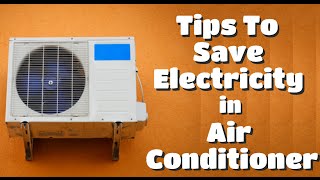How much electricity does your air conditioner consume?
As anybody who has seen their energy bill increase during the summer knows, air conditioner electricity usage may be a large, unpredictable expenditure. Start by looking at your AC unit's power rating (look for it on the condensing unit's label), which will tell you how much electricity it consumes under ideal conditions. Conditions are rarely so constant in real life.
However, there are online programmes that can help you calculate the cost of air conditioner electricity if you only want a broad estimate of how much power you're consuming. It's really easier to minimise your air conditioner's electricity use than it is to measure it! Here are eight strategies to consider.
Increase the temperature by one degree.
Could you identify the difference between a room with a temperature of 71 degrees and one with a temperature of 72 degrees? Most folks couldn't either. So, if you're attempting to save energy, consider setting your thermostat one degree higher than it usually is. It will make your air conditioner run less frequently and consume less energy.
This exercise will help you develop the habit of being aware of the temperature your thermostat is set to. Because air conditioner electricity use increases dramatically as the temperature outside rises, these minor improvements will add up over time.
Make sure everyone in your office is aware of your energy-saving goals. Begin by holding a meeting to outline the measures you'll take and how everyone can help. If you're the only one working on it, you won't be able to cut down on air conditioner power usage. Outline any adjustments (for example, a standard workplace temperature) or easy measures that everyone can take.
Keep the duct system clean and the airflow free.
If your air conditioner isn't fighting filthy vents and obstructed airflow, it will consume less energy. Keeping your air conditioner's vents and ducts clean will help them work more efficiently. Ensure that your furnishings and room arrangement do not obstruct the vents.
Use a smart thermostat and create a schedule.
To get the most out of your air conditioning, make sure it's only turned on when it's needed and that the temperature is adjusted correctly at all times.
You don't have to keep track of that, thankfully. It's simple to cut your air conditioner's power use by using an automatic or smart thermostat. Set your AC to not cool while no one is in the room, using a thermostat with a preset schedule. Some thermostats may learn your routine and train themselves over time. Smart thermostats also have an app that allows you to regulate the temperature remotely if you forget to set it.
Many of these thermostats are meant to save energy, so they may assist you in learning more about your energy consumption.
Make frequent maintenance visits a priority.
You'd understand why regular maintenance is so crucial if you could see what AC professionals see when they arrive to service a neglected air conditioner. Your system will work more efficiently and consume less power if the components are cleaned, electrical connections are repaired, and worn parts are replaced. According to research, air conditioner maintenance can help your unit retain up to 95% of its original efficiency.
Replace air filters as necessary.
You would not expect a clogged air conditioner filter to cause an increase in air conditioner power usage. A clogged filter, on the other hand, is like a blocked sink: stuff may go through, but it will run much more smoothly if it's clear. Filters may become clogged with dust, and if they're filled beyond their capacity, dust can collect on fans and motors, slowing down your system and forcing it to operate longer and consume more energy.
During routine maintenance visits, AC specialist will change your filters as needed. However, depending on how frequently you use your system, you may need to update it more frequently.
Did you know that you can make an aged air conditioner more energy efficient by replacing parts? If you aren't ready to move to a newer model, retrofitting may be a viable choice. You may lower your air conditioner's power usage in a number of ways without replacing it, including adding extra ventilation, condenser fan controls, and compressor replacement.
If your system is heavily utilised, consumes a lot of power, and has been well maintained (and is still in excellent working order), retrofitting may be a suitable alternative for you. Retrofitting is an excellent way to gain some of the benefits of a modern system without having to spend a lot of money on a complete replacement.
Insulate your room to keep cool air in.
If you let all that cold air go, you won't be getting the most out of your energy-efficient air conditioning. If you are unable to replace your air conditioning equipment, insulation might be a beneficial step in lowering air conditioner power usage. If you are meticulous about sealing up leaking locations in your house, your air conditioner will not have to work as hard to maintain the same temperature. Pipes, ducts, and outlets in the HVAC system might be high-priority areas for additional insulation.

